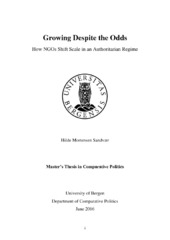Growing Despite the Odds - How NGOs Shift Scale in an Authoritarian Regime
Master thesis
Permanent lenke
https://hdl.handle.net/1956/12796Utgivelsesdato
2016-06-01Metadata
Vis full innførselSamlinger
Sammendrag
Similar non-governmental organizations in a similar context should, according to structural analysis have the same outcome. Why can we then observe differences in scale shift between similar organizations that are active in the same authoritarian context? Based on this puzzle, this thesis aims to explain what conditional factors that facilitate Chinese non-governmental organizations (NGOs) to shift scale. The Chinese authorities have strategically constructed regulations to control the spread of collective action, but the NGOs influence in China's public sphere is still growing. By using social movement literature, I conceptualize a framework based on three variable groups from the theoretical approaches of political opportunity structure, the strategic approach and cultural framing. Through a double paired comparison the possible explanatory variables are discovered and further discussed. Data and information is based on fieldwork, where interviews with NGO leaders and employees have been conducted. In addition to what has become an extensive body of literature on NGOs, collective action and civil society. The analysis finds support for the micro level strategic variables and therefore concludes that in regards of this study, Chinese NGOs are able to shift scale due to having experienced actors that make strategies in terms of cooperation, as well as framing clear defined tactics to solve the problems they identify. The thesis thus follows the critique of the structural approach, and argues for including more micro level dynamics, such as collective actor's strategic choices and decisions, when studying contentious politics, as posed by more recent social mobilization scholars.
